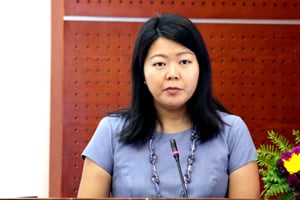Ha Noi, 27 August 2014 - Viet Nam is currently in the period of golden population with record numbers of young people. According to the 2009 Population and Housing Census, young people aged 10 to 30 years constitute approximately 40 per cent of the population of Viet Nam. Young people have played a significant role in Viet Nam's growth and they represent an increasingly important proportion of the labour force, both now and into the future. The issues related to their health and wellbeing, and especially sexual and reproductive health, are therefore of utmost importance to Viet Nam's productivity and development in the future.
This issue was actively discussed at the workshop on the implementation of laws and policies on sexual and reproductive health (SRH) for adolescents and youth in Viet Nam, organized today in Ha Noi by the Committee for Culture, Education, Youth, Adolescents and Children of the National Assembly (CCEYAC/NA) and the United Nations Population Fund (UNFPA) in Viet Nam. The workshop also discussed recommendations for the effective implementation of the SRH legislation and policies for adolescents and youth in Viet Nam.

Addressing the workshop, Mr. Dao Trong Thi, Chairman of the CCEYAC stressed that: "Sexual and reproductive health has become an important issue in the development course of Viet Nam's youth today. Taking care of the SRH for adolescents and youth is to create foundation and favorable environment for the development of both physical and spiritual aspects for young people."
Challenges on SRH information and services
Viet Nam has made impressive progress towards achieving the Millennium Development Goals (MDGs). Over the past decades, Viet Nam has invested a substantial amount of resources in the overall health and education of young people. However, young people still lack sufficient information and life skills related to reproductive health and sexuality. This leaves them vulnerable to high-risk behavior and ill-health outcomes, including unintended pregnancies, sexually transmitted infections (STIs), HIV, sexual abuse and gender-based violence.
The coverage of SRH services including family planning has been expanded and the quality of services has been improved. However, the SRH/FP programs are traditionally targeted for married couples only. No specific national programme addressing the growing needs of unmarried young people has yet been implemented. Sexuality education at schools remains limited. Certain groups, such as young migrants and ethnic minority youth, still have only limited access to SRH information and services. Data also show that one-third of Vietnamese young people continue to face barriers when trying to access reproductive health information and services, such as contraception.
Challenges on the implementation of laws and policies on SRH
As part of its 2014 agenda, CCEYAC/NA commissioned an assessment on "Implementing policies and laws on adolescent and youth sexual and reproductive health". The surveying team conducted work in 5 provinces, central-level cities and of relevant ministries and line agencies, held peer-review workshops across the North-Central-South parts of the country, and reviewed report findings from the Socio-cultural Committees and People's Councils of 52 out of the total 63 provinces and cities.
The draft assessment report prepared by CCEYAC/NA shows that the NA and Government have issued many laws and policies related to SRH for adolescents and youth. The implementation of these laws and policies has achieved some concrete results. However, a number of policies are still not practical enough and not properly guided and implemented. These shortcomings require the relevant state managing agencies to review and revise their policies so that they respond to the reality.
The provision of SRH for young people is not diverse, friendly and convenient enough for young people to access. The unmet need for contraceptives among youth is still high. The quality of the SRH services provided by private providers is not strictly managed, inspected, monitored and regularly assessed. Life skills education and teaching of SRH in schools have not been given due attention. The public-private mix approach and investment in this field remains limited. In addition, there are many socio-cultural reasons from family and society hindering the accessibility to SRH services and sexuality education.
More joint efforts to ensure comprehensive sexuality education and youth friendly SRH services are needed
Evidence shows that age-appropriate, gender-sensitive and life skills-based, comprehensive sexuality education can provide young people with the knowledge and skills they need to make informed decisions about their sexuality and lifestyle. Comprehensive sexuality education programs help youth to stay healthy and avoid negative sexual health outcomes such as unwanted pregnancy, unsafe abortion and sexually transmitted diseases including HIV. Therefore, Viet Nam needs to reinforce the implementation of sexuality education in schools and also build capacities for teachers to deliver the information effectively. Viet Nam also needs innovative approaches to deliver sexuality education at the communities.
As Viet Nam experiences rapid economic and social development, sexual norms and behavior are also changing. Young people become sexually active earlier, and due to limited access to SRH information and contraceptives they often have unprotected sex. Therefore, quality and youth-friendly reproductive health services that respond to young people's real needs need to be readily available, especially for unmarried young people. It is essential that these services are private and confidential, affordable, accessible to all, and delivered by trained health providers.
Promoting enabling environment for young people to decision making
Evidence shows that working in partnership with young people is an essential component of any successful youth programme, but young people often lack opportunities to be heard in the decision making. It is our responsibility to listen to our youth and take their suggestions into account in the policy design and implementation.
"We need more opportunities to participate in dialogues with policies makers. We also need more participation from vulnerable groups, such as out-of-school adolescents, youth migrants, ethnic minority young people. Let's listen to our voices! We would like to contribute our ideas and opinions to the development of youth related policies and laws", said Miss Ngoc Bich, a student from Ha Noi Public Health School.
Promoting sexual and reproductive health and rights of young people has to be placed at the center of Viet Nam's development policies and strategies
In order for young people to access comprehensive sexuality education and appropriate SRH services, we must ensure that the laws and policies really reach young people as intended. While the Government of Viet Nam has issued many impressive laws and policies for young people, much more effort is needed to enforce the implementation of these policies, especially at sub-national levels to ensure that all young people receive the vital information and services they need. Participants of the workshop recommended the government to allocate sufficient budget to address the unmet needs for SRH, especially contraception for unmarried young people, and even more so as the external support resources are declining.

Sexual and reproductive health and life skills are issues that greatly concern young people, among other important things such as education and employment. "This is a critical time for Viet Nam, and we have a critical role in ensuring young people the support they need to become the stewards of the future Viet Nam. Sexual and reproductive health is vital to our life. Promoting sexual and reproductive health and rights of young people has to be placed at the center of Viet Nam's development policies and strategies", said Ms. Ritsu Nacken, UNFPA Deputy Representative in Viet Nam.
On this occasion, the National Assembly and the UNFPA in Viet Nam call on leaders and law and policy makers to create favorable conditions and to engage, empower, and listen to young people's specific needs on SRH. Working together we can help contribute to caring, nourishing and developing the young generation in the development course of the country now and in the future.

